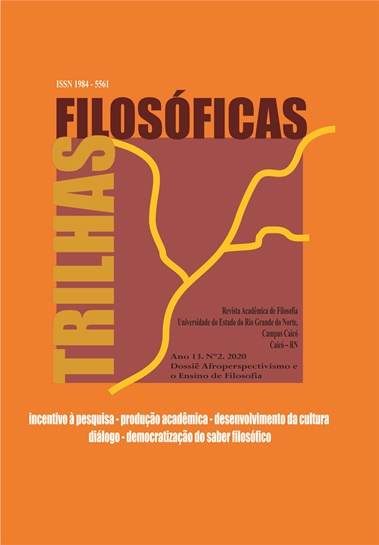The constitution of the autonomous subject in kantian thought taking as assumptions teaching methodologies
DOI:
https://doi.org/10.25244/tf.v13i2.4050Keywords:
Kant, Autonomy, Education, Will, PhilosophyAbstract
In these writings we will use a chapter from our master's dissertation addressing what Kant, Prussian philosopher of the eighteenth century, precepts about Autonomy, as well as his conception of education. We took as reference some works such as Fundamentation of the Metaphysics of Customs, where Kant presents the concepts of autonomy of will and duty, linked to the freedom of rational subjects; What is Enlightenment, in which the philosopher presents the concept of autonomy as a way out of rational minority; and On Pedagogy, a work in which Kant presents some ideas about education and how it should be thought of as a prerequisite for the achievement of the subjects' autonomy. In order to think about the autonomy of the will, it is imperative to resort to the third practical principle of the will, in reference to the Kantian categorical imperative, presented by the philosopher as the principle of autonomy of the will, or even, as some call it in Kantian moral philosophy, the "formula of autonomy".
Downloads
References
BRASIL. Lei n. 9.394, de 20 de dezembro de 1996. Diário Oficial da União, Poder Legislativo, Brasília, DF, 23 dez. 1996. Disponível em: <http://www.planalto.gov.br/ccivil_03?leis?19394.htm>. Acesso em: mar. 2017.
CARVALHO, Zilmara de Jesus Viana de. Palestra proferida aos alunos de pós-graduação em Filosofia. UFMA, 2018.
CARTOLANO, Maria T. Filosofia no ensino de 2º grau. São Paulo: Cortez: Autores Associados, 1985.
KANT, Immanuel. Que significa orientar-se no pensamento? (1786) Tradutor Arthur Morão. Disponível em: <http://files.filsofiaonline.webnode.com.br/200002745-e634be72e7/KANT.%20Que%20significa%20orientar-se%20no%20pensamento.pdf> Acesso em: nov. 2017.
KANT, Imnanuel. Resposta à pergunta: Que é o esclarecimento? In.: Textos Seletos. Tradução de Floriano de Souza Fernandes. 4. ed. Petrópolis: Vozes, 2010.
_________. (1724 – 1804). Antropologia de um ponto de vista pragmático. Trad. Clélia Martíns, - São Paulo: Iluminuras, 2006.
_________. (1724 – 1804). Sobre a pedagogia. Tradução de Francisco Cock Fontanella. 2. ed. Piracicaba: Editora Unimep, 1999.
_________. Crítica da faculdade do juízo. Trad. Valério Rohden e António Marques. Rio de Janeiro, Forense Universitária, 1993.
_________. (1724 – 1804). Textos selecionados: Fundamentação da metafísica dos costumes. Seleção de textos de Marilena de Souza Chauí: Traduções de Tania Maria Bernkopf, Paulo Quintela, Rubens Rodrigues Torres Filho. – São Paulo: Abril Cultural, 1986.
_________. (1724 – 1804). Fundamentação da metafísica dos costumes. Tradução Paulo Quintela, 117 p. (textos filosóficos). Lisboa: Edições 70, 2007.
Downloads
Published
How to Cite
Issue
Section
License
Copyright (c) 2022 Ediel dos Anjos Araújo, Angelo Rodrigo Bianchini

This work is licensed under a Creative Commons Attribution-NonCommercial-ShareAlike 4.0 International License.
DECLARAÇíO DE DIREITO AUTORAL
1 Ao submeter trabalhos í revista Trilhas Filosóficas, caso este seja aprovado, o autor autoriza sua publicação sem quaisquer ônus para a revista ou para seus editores.
2 Os direitos autorais dos artigos publicados na Trilhas Filosóficas são do autor, com direitos de primeira publicação reservados para este periódico.
3 Fica resguardado ao autor o direito de republicar seu trabalho, do modo como lhe aprouver (em sites, blogs, repositórios, ou na forma de capítulos de livros), desde que em data posterior fazendo a referência í revista Trilhas Filosóficas como publicação original.
4 A revista se reserva o direito de efetuar, nos originais, alterações de ordem normativa, ortográfica e gramatical, com vistas a manter o padrão culto da língua, respeitando, porém, o estilo dos autores.
5 Os originais não serão devolvidos aos autores.
6 As opiniões emitidas pelos autores são de sua inteira e exclusiva responsabilidade.
7 Ao submeterem seus trabalhos í Trilhas Filosóficas os autores certificam que os mesmos são de autoria própria e inéditos, ou seja, não publicados anteriormente em qualquer meio digital ou impresso.
8 A revista Trilhas Filosóficas, motivada em dar ampla divulgação das publicações, poderá replicar os trabalhos publicados nesta revista, através do link da edição de um número publicado, ou mesmo fornecendo o link de artigo específico publicado, em outros meios de comunicação como, por exemplo, redes sociais (Facebook, Academia.Edu, Scribd, etc).
9 A revista Trilhas Filosóficas adota a Política de Acesso Livre para os trabalhos publicados sendo sua publicação de acesso livre, pública e gratuita. Portanto, os autores ao submeterem seus trabalhos concordam que os mesmos são de uso gratuito sob a licença Creative Commons - Atribuição Não-comercial 4.0 Internacional.
10 O trabalho submetido poderá passar por algum software em busca de possíveis plágios para averiguar a autenticidade do material e, assim, assegurar a credibilidade das publicações da Trilhas Filosóficas e do próprio autor diante da comunidade filosófica do país e do exterior.
11 Mas, apesar disto, após aprovação e publicação do artigo, for constatando qualquer ilegalidade, fraude, ou outra atitude que coloque em dúvida a lisura da publicação, em especial a prática de plágio, o trabalho estará automaticamente rejeitado.
12 Caso o trabalho já tenha sido publicado, será imediatamente retirado da base da revista Trilhas Filosóficas, sendo proibida sua posterior citação vinculada a ela e, no número seguinte em que ocorreu a publicação, será comunicado o cancelamento da referida publicação. Em caso de deflagração do procedimento para a retratação do trabalho, os autores serão previamente informados, sendo-lhes garantidos o direito í ampla defesa.
13 Os dados pessoais fornecidos pelos autores serão utilizados exclusivamente para os serviços prestados por essa publicação, não sendo disponibilizados para outras finalidades ou a terceiros.



